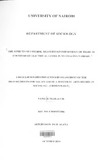| dc.description.abstract | Counterfeiting is a global concern since it impacts negatively on innovation and poses a threat to the welfare of consumers. It also lowers tax revenues, increases the cost of implementing anti-counterfeiting measures and contributes to substantial resources that are channeled to criminal networks. Counterfeiting also affects business by impacting on sales and licensing, brand value and firm reputation and the ability of firms to benefit from the breakthroughs they make in developing new products. Consumers too are affected by the significant health and safety risks that substandard counterfeit products pose to those who consume the items. The Kenya Association of Manufacturers (KAM), estimated that counterfeits costed local companies more than Sh50 billion in 2008 while the government lost Sh19 billion in taxes due to the manufacture and sale of counterfeit goods.
This study sought to assess the effects of control measures on the prevention of trade in counterfeit electrical goods in: the Nyamakima area of Nairobi Central Business District. The site of the study was Nyamakimaarea in downtown Nairobi which is to the East of the C.B.D. and is positioned in between Kirinyaga and River roads and is also part of the Grogan area. The site consists of mainly retail and wholesale businesses dealing in electrical products, textiles, automotive spare parts and stationery that are patronized by consumers from the middle and low end of the income brackets. A sample size of 32 persons was chosen purposively from traders of electrical goods in shops located in Nyamakima area. The study revealed that 41 percent of participants dealt in electrical items for single phase while 34 percent dealt in electrical fittings and appliances with the rest (25 percent) dealing in domestic electrical items. The most popular electrical items according to respondents were Philips fittings including bulbs and tubes represented by 44 percent followed by foreign brands of switches and sockets at 41 percent and lastly a mix of East African Cables, electrical pipes and imported cables at 15 percent.
About 69 percent of the respondents sourced their stock of electrical items mostly from China and Dubai followed by 28 percent who sourced from local manufacturers, distributors and wholesalers while 3 percent sourced their stock from Europe. Majority of the respondents (66 percent) have handled non genuine imported electrical brands while 31 percent have handled non genuine Lorenzetti showers and immersion heaters. Only 3 percent of the respondents indicated that they have not handled non genuine electrical items of any type. Many of the respondents totaling 60 percent indicated that they sold counterfeits in cases when customers! demanded for cheap and affordable items while 16 percent of the respondents did not indicate any reasons for selling such items. A few respondents (12 percent) said that they sold counterfeits when genuine items were out of stock while a similar number (12 percent) sold the items either when they failed to differentiate between genuine and counterfeit items or when they required to recover costs.
The study also revealed that legal measures were not effective in preventing trade in counterfeit electrical goods, as evidenced by those respondents who rated poor (56 percent) and those who rated very pO,or at 35 percent. Similarly, KRA was rated poor and very poor by 44 percent each of the respondents. A majority of respondents (72 percent) also rated KIPI's performance as very poor. About 84 percent of the respondents revealed that they did not often encounter anti counterfeit officers in their business practice while 16 percent never encountered the officials. Out of the 22 respondents who indicated they were told by enforcers that their stock was not genuine, 14 bribed officers while 4 did not bribe the officers. Only 10 respondents indicated that they were not told by enforcers that their stock was not genuine and therefore did not bribe officers.
This study found that with regard to strategies to strengthen control measures, 25 percent of the respondents recommended seizure and destruction of counterfeit electrical items while another 25 percent proposed the enforcement of laws. The rest of the respondents recommended strengthening control measures through increasing sensitization and education of stakeholders (22 percttnt), increasing capacity of agencies (16 percent), constantly reviewing legal instruments (9 percent) and making genuine products affordable (3 percent). Important recommendations offered in this study include the government to ensure that the legal instruments available are reviewed constantly so that they are punitive and deterrent in nature.
The enactment and operationalization of the Anti-Counterfeit Goods Act of 2008 is therefore the recommended way forward. The government should also sensitize and educate law enforcement agencies, the public, right holders and the users on the importance of protecting and enforcing intellectual property rights. The capacity of KEBS and KRA in terms of resources and personnel should be increased in order for them to playa vital role in ensuring that inspection is done on goods on transit to avoid dumping of substandard goods into the country. | en_US |

